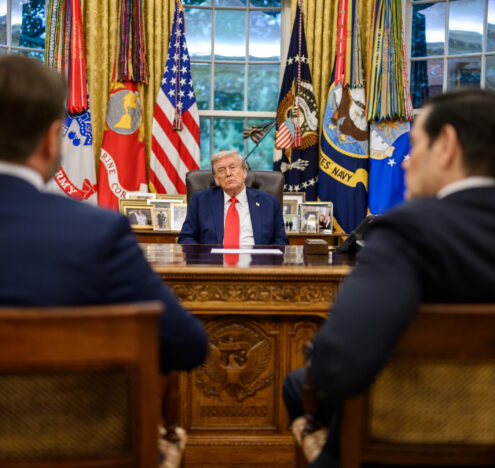Russia invaded Ukraine almost a year ago. Now, more than 10 million Ukrainians have been forced to flee their homes, many of them into refugee status in foreign countries. According to an estimate by Chairman of the Joint Chiefs of Staff General Mark Milley, “You’re looking at well over 100,000 Russian soldiers killed and wounded… Same thing, probably on the Ukrainian side.”
The immediate Western response to the invasion was the announcement of far-reaching sanctions on Russia. The White House was so convinced that the sanctions would have a devastating impact that in its May 24, 2022 “Fact Sheet,” it quoted the Institute of International Finance as stating: “The economy is forecast to contract as much as 15% or more in 2022. This economic collapse of Russia’s GDP will wipe out the past 15 years of economic gains in Russia.” According to the latest estimates by the International Monetary Fund, Russia’s economy contracted by 2.2% in 2022. The difference between this number and the projected 15% contraction indicates how much Western countries relied on sanctions to hurt President Vladimir Putin, his cronies, and the Russian economy.
The sanctions included the freezing of around $300 billion of Russian official funds, barring Russian banks from access to international payments systems, limiting the range of goods that countries opposed to Russia should import, and individual sanctions on scores of Russian politicians, officials, and businessmen — the so-called oligarchs.
Russia’s generals have failed to meet the goals set by Putin, but its economists, technocrats, and diplomats have proven to be exceptionally skilled in finding ways to keep the economy stable. The lack of impact of the sanctions raises profound issues regarding the degree to which Western governments adequately understand how to impose sanctions. This is a critical issue given that effective sanctions can be a vital tool in our national security armory to combat aggressive authoritarian regimes.
A BRIEF REVIEW OF SANCTIONS
The logic behind the sanctions’ strategy was an understanding that political power in Russia rests upon collusion between military and intelligence officials, organized crime, and business tycoons. Yet, these are not independent actors. They operate together for mutual benefit and understand that to seek to leave the conspiracy may result in prison or death — now and again, the international media reports that another prominent Russian entrepreneur has fallen to his death from the balcony of an international hotel or a hospital.
The most significant roadblock to sanctions being effective is the failure of Western governments to use their full diplomatic leverage to pressure banks and corporations from doing business in Russia.
Sanctions, however, started well. No sooner had the Russians made their first military moves on Ukraine than the media was alerted by justice authorities in the United States and western Europe that there were sprawling mansions and vast shiny yachts belonging to Russian oligarchs in their midst. All would be frozen so that their owners could no longer use them.
Roman Abramovich, one such oligarch, had to accept that he would have to start looking for a buyer for his pride and joy, the Chelsea Football Club. Russian banking billionaires Mikhail Fridman and Petr Aven were forced to quit their UK-based international investment firm, Letter One. And the Kennedy Center in Washington DC swiftly changed the name of its “Russian Room” to the “Circle Room” — its former name resulted from a $5 million gift from one of Russia’s wealthiest oligarchs, Vladimir Potanin, who, even before being placed on the US sanctions list resigned from the board of directors of New York’s Guggenheim Museum.
These actions, and many like them, came hard and fast as US Attorney-General Merrick Garland announced on Mar. 2, 2022 that he was setting up Task Force KleptoCapture, an interagency law enforcement task force “dedicated to enforcing the sweeping sanctions, export restrictions, and economic countermeasures that the United States has imposed, along with allies and partners, in response to Russia’s unprovoked military invasion of Ukraine.”
While US and European authorities have managed to seize some of the big yachts and mansions, very few assets belonging to those on the Russian sanctions lists were confiscated. Seizing assets is merely temporary, while confiscation demands that the authorities prove in court that the assets were purchased with criminally obtained funds.
THE ART OF EVADING SANCTIONS
Western investigators have been desperately slow in finding the assets and the evidence to bring criminal charges to confiscate assets. According to Andrew Adams, Director of the KleptoCapture Task Force, less than $1 billion in Russian assets have been confiscated.
Russians were transferring assets to family members or friends to evade sanction seizures, or they were buying houses and docking yachts out of the reach of European and US authorities in such places as Turkey and the United Arab Emirates. Both countries have important strategic relationships with the United States, but they have been able to profit from attracting Russian investments and have ignored warnings from the Biden administration. Turkey especially has been able to export goods to Russia without fear of reprisals for violating sanctions. Still, the massive amounts of hard cash under oligarch control can only be safely — and secretly — invested in the large capital markets of the United States and the major European economies.
So far, the oligarchs, thanks to their skilled enablers, have evidently outsmarted the KleptoCapture agents and other officials hunting for the stolen cash. At most, the sanctions have proven to be an inconvenience.
Even more serious is the failure of the sanctions to do real damage to the Russian economy. Just as the oligarchs have escaped hardships, the Russian economy was not crippled in the first year of the assault on Ukraine, mainly because the Russian government found ways to continue to secure very large amounts of cash from selling oil. The governments of Turkey, China, as well as numerous neighboring countries east of Russia, ignored the sanctions and found ways to export needed products to Russia. Some technology products, plus many consumer products, such as cell phones and washing machines, have been trucked into Russia from Belarus, China, and Kazakhstan. It is quite possible that Russia is importing military supplies as well. Trade to and from Russia through Ukraine has now been largely diverted, with Georgia seeing exceptionally heavy truck traffic, notably supporting Russian trade with Turkey.
The economic sanctions may have an even more modest impact as time goes on. In January 2023, the International Monetary Fund (IMF) noted that Russian GDP is likely to be modestly positive in 2023: “At the current oil price cap level of the Group of Seven, Russian crude oil export volumes are not expected to be significantly affected, with Russian trade continuing to be redirected from sanctioning to non-sanctioning countries.” Further, the IMF is now projecting Russia with economic growth of 2.1%, which is significantly above that of the United States at 1%, the Euro Area at 1.6%, and the United Kingdom at 0.9%.
Even some Western-headquartered banks continued to find ways to operate in Russia. An article in Euromoney magazine posed the question in the headline: “Why are Raiffeisen and UniCredit still in Russia?” Respectively leading Austrian and Italian banks, they have long been among the largest foreign banks active in Russia. They have continued to operate in lending to Russian companies and engaged in international transactions. For example, in late January 2023, UniCredit stated that its Russian-related revenue in the fourth quarter of 2022 was €354 million (about $380 million), up 88.2% from the previous year, and driven by high interest rates and a strong rouble.
One of the reasons why sanctions have failed to make an impact on the oligarchs is because of inadequate enforcement by Western justice authorities of anti-corruption and anti-money laundering regulations and laws. For example, in 2018, when thanks to a whistle-blower in Estonia the Danske Bank scandal became public knowledge, it appeared that the Estonian branch had handled around $235 billion for mostly Russian clients. On Dec. 13, 2022, the US Department of Justice announced that it had fined Danske Bank — the largest bank in Denmark — $2 billion for fraud against US banks, noting that between 2008 and 2016, the Danish bank transferred $160 billion into the United States through four New York banks. But where did the other $75 billion go?
In all probability, the cash went into the United Kingdom, Switzerland, and into capital markets and international investment and banking firms across the European Union. Every transaction needed chains of enablers to create the holding companies, to mask the identities of the true owners, to conceal just where the cash would be invested and how it would be deployed — be it to buy valuable art at the auction houses, or secure secret arms deals, or purchase important technology, or bribe Western officials to counter official investigations. For example, former top FBI investigator Charles F. McGonigal, whose brief had included monitoring sanctioned Russians, was charged in early 2023 in New York with allegedly taking bribes from Russian oligarch Oleg Deripaska.
ENABLING THE ENABLERS
The Department of Justice has not named the four New York banks that took Danske Bank’s cash. There is no public record of any charges being brought by US authorities against these banks for accepting a massive amount of cash from a tiny branch office of a Danish bank based in Estonia whose clients were not clearly identified as the money moved to New York.
In December 2022, the UK’s National Crime Agency made a brief public announcement that it had arrested three individuals, including “a wealthy Russian businessman,” on suspicion of money laundering. Details of the case were not announced. Neither were the names of those arrested who were all released on bail. A shop-lifter in the United Kingdom might be brought before a court in public, but a wealthy Russian (with probably a couple of his money laundering enablers) secured secrecy from the British authorities.
Deeply rooted in the culture of Western justice authorities is a tolerance for white-collar crime, especially when perpetrated by major institutions, be they prominent banks, law firms, or giant auditing companies.
Why is implementation so difficult? Part of the problem is the culture of justice systems around the world. Deeply rooted in the culture of Western justice authorities is a tolerance for white-collar crime, especially when perpetrated by major institutions, be they prominent banks, law firms, or giant auditing companies. A convention has evolved under which the big corporations settle charges of corruption, money laundering, and fraud by paying fines. The top executives are rarely, if ever, personally hauled into court.
This is part of the explanation, together with the lobbying skills of banks, law firms, and others engaged in enabling illicit financial flows of cash, of why there are inadequate resources available to Western government agencies to enforce anti-corruption laws. For example, the US Treasury’s Financial Crimes Enforcement Network (FinCEN) is responsible for reviewing hundreds of thousands of suspicious transactions reported by US banks, as well as pursuing other key illicit finance operations. Currently, it is gearing up to register millions of companies whose beneficial ownership is masked in ways that enable gangsters and oligarchs from revealing the scale of their US investments. Yet, on Dec. 19, 2022, Congress boosted the budget of FinCEN by 18% to $190 million — a pathetically small amount given the enormous tasks that it needs to perform.
The most significant roadblock to sanctions being effective is the failure of Western governments to use their full diplomatic leverage to pressure many governments to cease trading with Russia or allow their banks and corporations to continue doing business in Russia. This failure continues to make life harder for Ukrainians as the war goes on.
It is urgent that the leaders of Western governments fully review the experiences with sanctions over the last 12 months and develop strategies that can make them far more effective. This a complicated challenge, but the hard facts suggest that when the sanctions were announced almost one year ago, there was too much optimism about their potential impact, without sufficient analysis of the likely paths Russia would take to counter the sanctions — paths that involved convincing the United Arab Emirates, Turkey, China, Belarus, Georgia, Azerbaijan, and others to continue trading, to circumvent sanctions for Russia if necessary, and host oligarchs if that too was called for.
Western governments have largely failed to convince the governments of these countries that there is a price to pay for violating economic sanctions as Russia proceeds with its aggression against Ukraine. International security requires a far more meaningful understanding by all countries that seek to maintain good relationships with the United States and West European countries that these economic sanctions start to have a truly crippling impact on Russia’s economy.




















